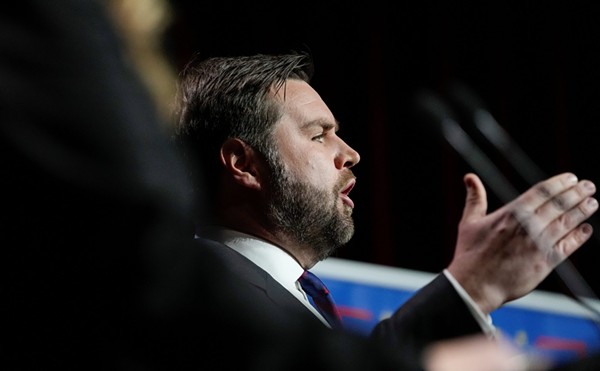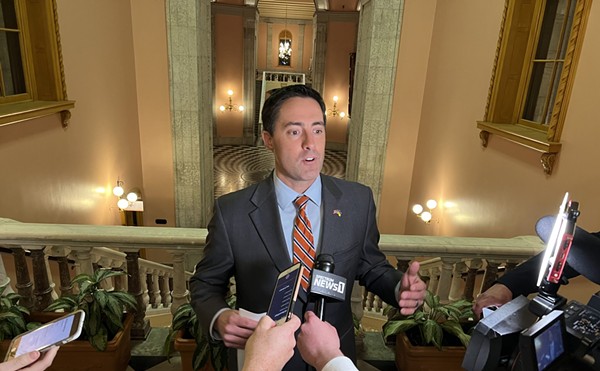There was the e-mail from the Young Democrats, urging people to register for the annual conference. Another from the Ohio Audubon Society asked recipients to support improved rail service. She received plenty of messages from lefty groups opposing Congress's plan to open the Alaskan National Wildlife Refuge to oil drilling, and one from state Senator Eric Fingerhut on his new tax proposal.
Still, Gwinn sat before her computer, astonished. The deadline was fast approaching for Ohio Democrats to challenge a new law that could give Republicans a permanent majority. Instead of fighting it, however, the party did what it so often does: cast urgent messages into the black computer void, hoping that someone else does something.
"It was frightening to watch, really," says Gwinn, president of the Athens County Democratic Party. "I remember thinking, 'My goodness. How can this be happening?'"
While the state party did virtually nothing, Gwinn and a handful of activists organized a petition campaign to repeal House Bill 1. The law, written in the wake of a fund-raising scandal that ruined the careers of state Treasurer Joe Deters and Speaker of the House Larry Householder, was supposed to reform Ohio's pay-to-play campaign finance system. Instead, it allows influence to be purchased like never before.
The law nearly quadruples -- to $10,000 -- the maximum amount a person can give to a political campaign. It also allows people to donate the maximum on behalf of any child above age seven. Since people can give during both the primary and general elections, it means that a wealthy, married person with two children can donate $80,000 to a lowly state representative in a single year. "That's not campaign reform," says Eugene Grande, president of Wayne County's Democratic Party. "That's campaign skulduggery."
And just to tilt the game even more in Republicans' favor, the law bans unions -- among the few Democratic sugar daddies -- from donating to campaigns while simultaneously allowing corporations to make direct contributions for the first time in decades.
In short, it guarantees that conservatives will have a huge financial advantage for years to come. "The chamber folks were really pleased," says Bill Todd, lawyer for the Ohio Chamber of Commerce, which helped write the law.
For Democrats, it was a death blow. "How many Democrats do you know that can give $10,000 apiece to a politician?" asks Grande. "Not many, I can tell you that."
After Republican Governor Bob Taft signed the bill on December 20, Democrats had 90 days to gather enough signatures to place an initiative on the ballot that would give voters the chance to overturn the law. The effort would be difficult. They would need an army of volunteers, plus at least $300,000 to pay a private company to hire signature gatherers. "It can be done," says Paul Ryder, who studies ballot campaigns for Ohio Citizen Action. "But it's very demanding."
Then again, after innumerable fund-raising scandals in Columbus, which often make the Statehouse resemble an auction block, they appeared to have a compelling issue. After all, how many Ohioans actually believe it should be easier to buy influence?
Democrats also had phone numbers and e-mail addresses for thousands of John Kerry campaign volunteers, many of whom were looking for something constructive to do after the state's flawed November elections. And since Ohio was the focus of so much national attention during the presidential election, raising the money would have been hard, but not impossible. "I believe we could have succeeded," says Joe Logan, president of the Ohio Farmers Union, which helped gather signatures.
Democratic leaders seemed to understand the danger of the law. "If you allow corporations to have that kind of power, middle-class Americans get screwed," says Denny White, president of the state party.
But many Democrats believe it was White who screwed them most.
By the end of November, everyone knew the legislature would pass a campaign finance bill written to favor Republicans. But party leaders never spread the word. It wasn't until the end of January that unions, county leaders, and lefty activists began gathering signatures. By then, it was already too late. "The organization needed to be there and ready to go on day one," Ryder says. "Meanwhile, it got to be January, February, and they're still just talking about it. By then, they never had a serious shot."
Nevertheless, hundreds of volunteers spent two months gathering signatures, carrying petitions door-to-door through the snow. White and fellow state leaders barely lifted a finger.
Gwinn noticed it three weeks ago, when she visited the party's website and found nothing about the petition drive. She called White's office and asked that he send an e-mail to Democrats across the state, urging them to get involved. White's assistant sounded lukewarm to the idea, she says. Finally, White asked Gwinn to write the e-mail herself. "Yeah, I got that e-mail," says John Wagner, executive secretary of the Akron AFL-CIO. "My first thought was 'Who the heck is she?'"
But even if White himself had sent the e-mail, it would have fallen flat. Cindy Marizette is executive director of the Democratic Party in Cuyahoga County, the largest Democrat-controlled party in the state. She never heard from White or any other state leader. Gwinn's e-mail didn't arrive until days before the deadline. "Don't send me an e-mail," Marizette says. "If it was such an urgent need, you pick up the phone."
With no direction coming from Columbus, most activist groups didn't hear about the campaign at all. Some even tried to create a new organization to push for fairer elections, unaware of any petition drive intended to do just that. "I just don't think the state Democrats understood the ramifications," Wagner says. "It just really kills them."
White denies that he did virtually nothing to stop House Bill 1 from becoming law. "Whoever's making that allegation has their head up their you-know-what," he says.
He assigned a staffer to enter names from the petitions into a database, he says. And he used party records to help unions find people who care about campaign finance reform. "The AFL-CIO took the leadership role on this," White says, "so why duplicate their efforts?"
The answer comes in the drive's pitiful results, his critics say. A coalition including the AFL-CIO, a handful of county Democratic chairs, and a few citizens groups managed to gather 30,000 signatures, a fraction of the 190,000 needed. But they point out that they were working with only a small number of volunteers, no money, no leadership, and little help from the state party. "We're very small players," says Greg Coleridge, organizer for the American Friends Service Committee, a Quaker group that gathered 2,500 signatures. "The party should have led this effort. We needed the big boys coming in with the big numbers."
Some wonder whether White's failure was actually misguided strategy rather than simple bungling. Democratic mayors control most Ohio cities, and the higher contribution limits will likely help them raise money from corporate and wealthy donors for their reelection campaigns. "You've got Democrats in all the major cities in this state . . ." White says. "It might help them personally."
But Democrats don't have much to worry about in the cities. It's the growing suburbs and the countryside that have given Republicans unilateral control of Ohio. "If that's the strategy, it's just plain stupid," says Wagner. "It gives the Republicans a lock on the Statehouse . . . The problem is Denny White. I mean, my God, it's embarrassing that Democrats don't hold a single state office."
In the meantime, party grunts will remember the petition drive of 2005 as emblematic of an organization that would rather die than change. "This is a classic," Coleridge says. "This should be the poster child of what is wrong with the Democratic Party."












